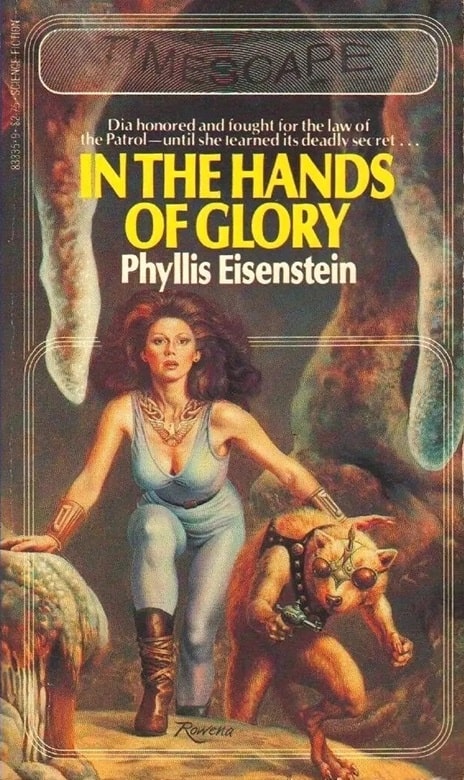 |
 |
In the Hands of Glory (Timescape/Pocket Books, November 1981). Cover by Rowena Morrill
Here’s my new look at an SF paperback from the ’70s/’80s. Phyllis Eisenstein’s In the Hands of Glory is a book I eagerly bought and read back when it came out, in 1981. By a writer whose work I enjoyed. From a publishing imprint (Timescape, edited by David Hartwell) that I greatly respected. (Not to mention the Rowena Morrill cover which, let’s just say, overtly exaggerates certain physical characteristics of the protagonist relative to her actual depiction in the book.) And I had fond, but very dim, memories of the book. So I reread it.
Phyllis Eisenstein (1946-2020) was a Chicago writer. Black Gate is a Chicago-based ‘zine, and I’m originally from the Chicago area myself, and over the years I got to know Phyllis and her husband (and sometime collaborator) Alex fairly well, from meeting them at any number of conventions. Indeed, at this year’s Windy City Pulp and Paper Convention, I had a long conversation with Alex which touched on their time in Germany (Alex was in the military then) during which Phyllis drafted her first novel.
[Click the images to glory in bigger versions.]
 |
 |
The Alaric collection Born to Exile (Dell, April 1980). Cover by Richard Courtney
I discovered her work (as, I suspect, did many) with the Alaric stories in F&SF, about a minstrel with the power of teleportation. These were fixed up into two very enjoyable novels, Born to Exile and In the Red Lord’s Reach, and there were a couple of later stories. I also very much enjoyed her novel Sorcerer’s Son, though somehow I never got to its sequel, The Crystal Palace.
And, as noted, I read In the Hands of Glory with enjoyment. In addition, her novella “In the Western Tradition,” which appeared the same year as In the Hands of Glory, and which was nominated for both a Nebula and a Hugo, is in my opinion a wonderful story, and quite underappreciated these days.
 |
 |
The Magazine of Fantasy & Science Fiction, March 1981, containing the Hugo
and Nebula nominee “In the Western Tradition.” Cover by Paul Chadwick
So, how was In the Hands of Glory on reread?
Hmmm. I hesitate to use the phrase “suck fairy,” because I can’t say the book sucked, and also because I think the “suck fairy” more often strikes because a book’s social attitudes and assumptions have become dated. That said — my reread was a disappointment. The book was not nearly as good as my fond — but dim — memories had advertised.
It’s told from the point of view of Dia Catlin, a young Patroller on the planet Amphora. The Patrol is a military organization, formerly part of the now defunct Stellar Federation. They have taken control of Amphora, ostensibly to protect the locals from external threats in the chaotic situation following the dissolution of the Federation. As the story opens, Dia and her lover Michael are flying a Patrol airplane when it is shot down.
Inside cover of In the Hands of Glory
Michael dies, but Dia is able to fly the plane to a marginally successful landing — “successful” in the sense that she survives enough to wake up later under the medical care of a doctor working for the Amphoran rebels. Over some time she recovers, while maintaining her insistence that the rebels are merely ungrateful for the assistance the Patrol has provided. She refuses to give them information about the Patrol, while learning some interesting things, such as the presence of an alien race that seems to be aiding the rebels. She also, against her will, is starting to find the rebel doctor very attractive… And then the doctor allows Dia to escape…
Back in the Citadel, home of the Patrol, Dia is treated as a hero. She gets a promotion, and a new role. For the leader of the Patrol, Brigadier Velicher, has taken a fancy to her, and takes her as his new mistress. Dia doesn’t seem to have much choice in the matter, and, to be honest, the depiction of her “romance” with her earlier lover Michael seems similarly an abuse of power by an older man (though she is portrayed as actually loving Michael while only tolerating the attentions of the Brigadier, who is, anyway, good in bed.)
But, well, there are hints slowly building in the back of her mind that maybe the Patrol isn’t quite as virtuous as portrayed to its members. (Parts of this section reminded me of a current Hugo nominee, Emily Tesh’s Some Desperate Glory.)
Some Desperate Glory by Emily Tesh
(Tor.com, April 11, 2023). Cover by Cynthia Sheppard
Okay, let’s stop there. All of this is crystal clear already to any SF reader. It’s obvious from the getgo that the Patrol are the bad guys. It’s obvious that Dia will end up with the cute and noble doctor. It’s obvious that the Brigadier is a creepy old man. Oh, and the “mystery” about the alien race that is helping the rebels is obvious too. (Also, the aliens are very Ewok-like, though to be fair this book was published before The Return of the Jedi came out so perhaps a more appropriate comparison would be H. Beam Piper’s Fuzzies.)
There are some interesting things in the background, though. Dia’s mother and father — who are divorced — as well as her sister Sydney are well-portrayed characters, by no means evil even though they are loyal to the Patrol.
Well, things come to a climax. The cute doctor is kidnapped and tortured. Dia is forced to realize that the Brigadier is pretty sadistic, and also that she should let the doctor redeem his “One Free Escape” card. And soon enough Dia is at the absolute center of the rebels’ plans…
 |
 |
In the Red Lord’s Reach (Signet/New American Library, July 1989). Cover by Richard Hescox
Nothing here surprises. And the resolution is way too rapid, and way too easy. Dia’s “conversion” is under-motivated. Her love affair with the doctor is kind of a damp squib. The action scenes come off pretty flat. The stratagem at the center of the rebels’ plot is very implausible.
In the final analysis, this isn’t a very good novel – it relies on too much coincidence, there are too many clichés, there isn’t enough time taken to build real tension and real relationships, nor to motivate some characters’ decisions.
Against that criticism, I should say that it reads quickly and I was never bored, and that I did enjoy the reading, despite my reservations.
Rich Horton’s last article for us was a review of The Fallible Fiend by L. Sprague de Camp. His website is Strange at Ecbatan. Rich has written over 200 articles for Black Gate, see them all here.

